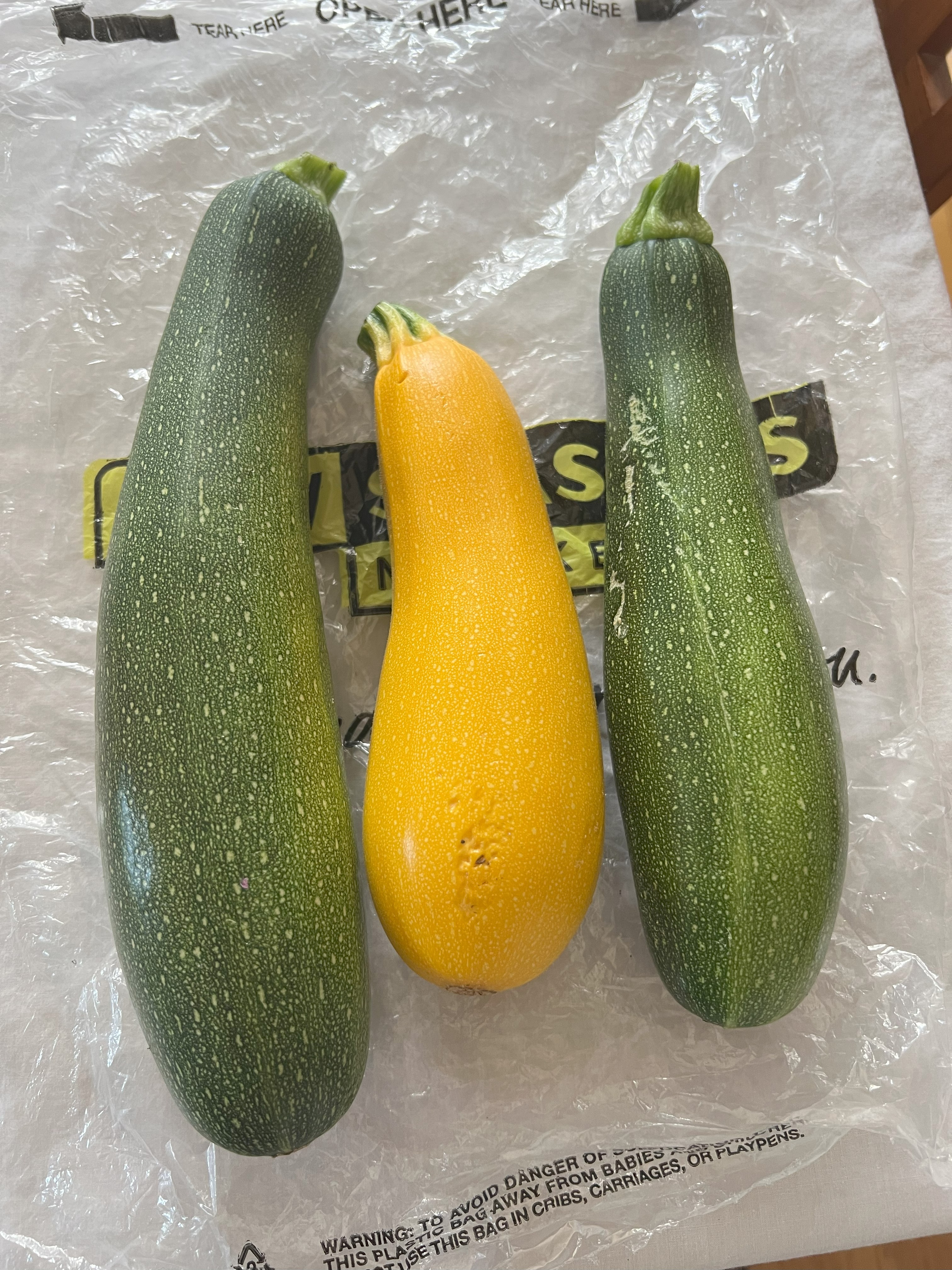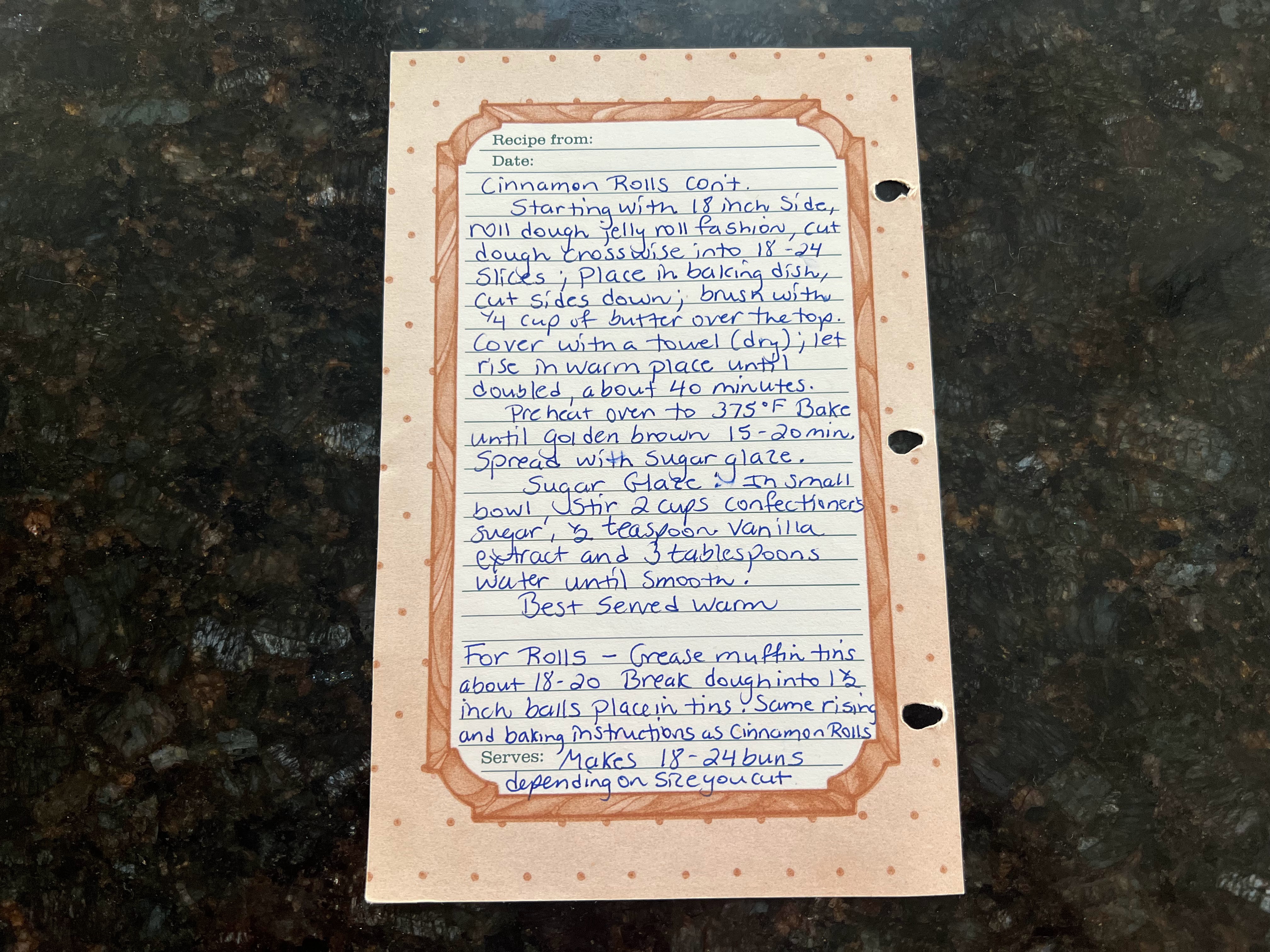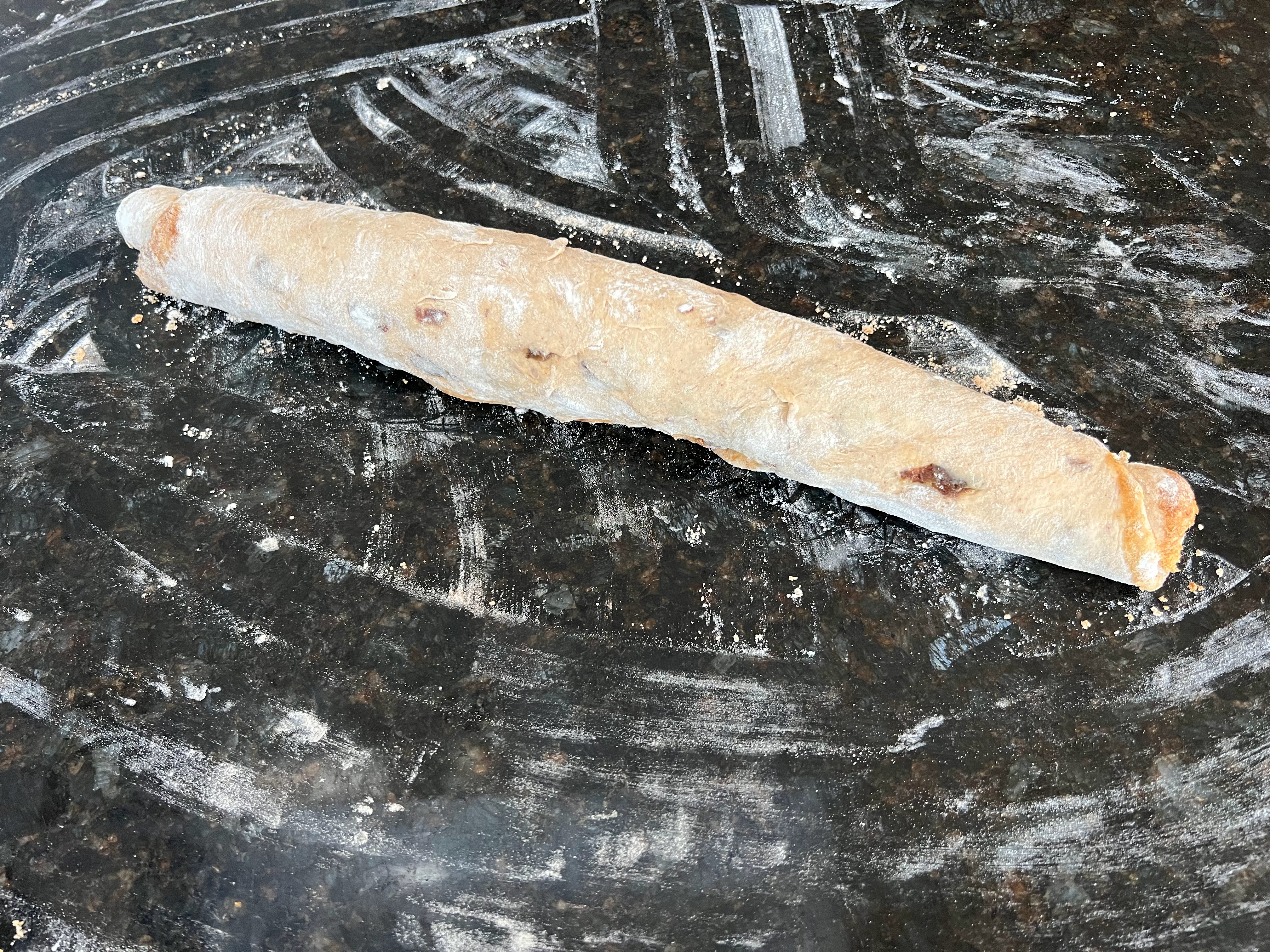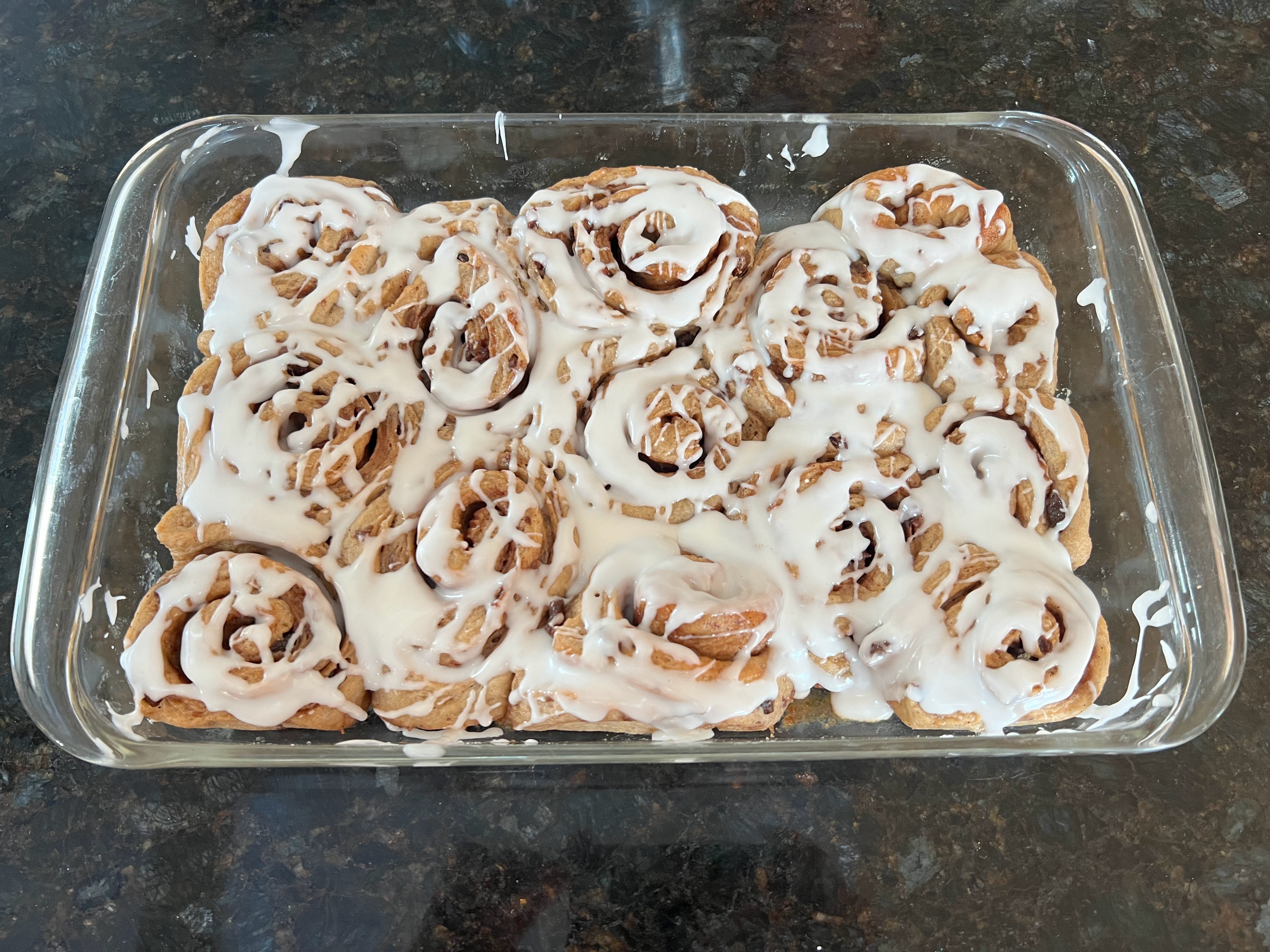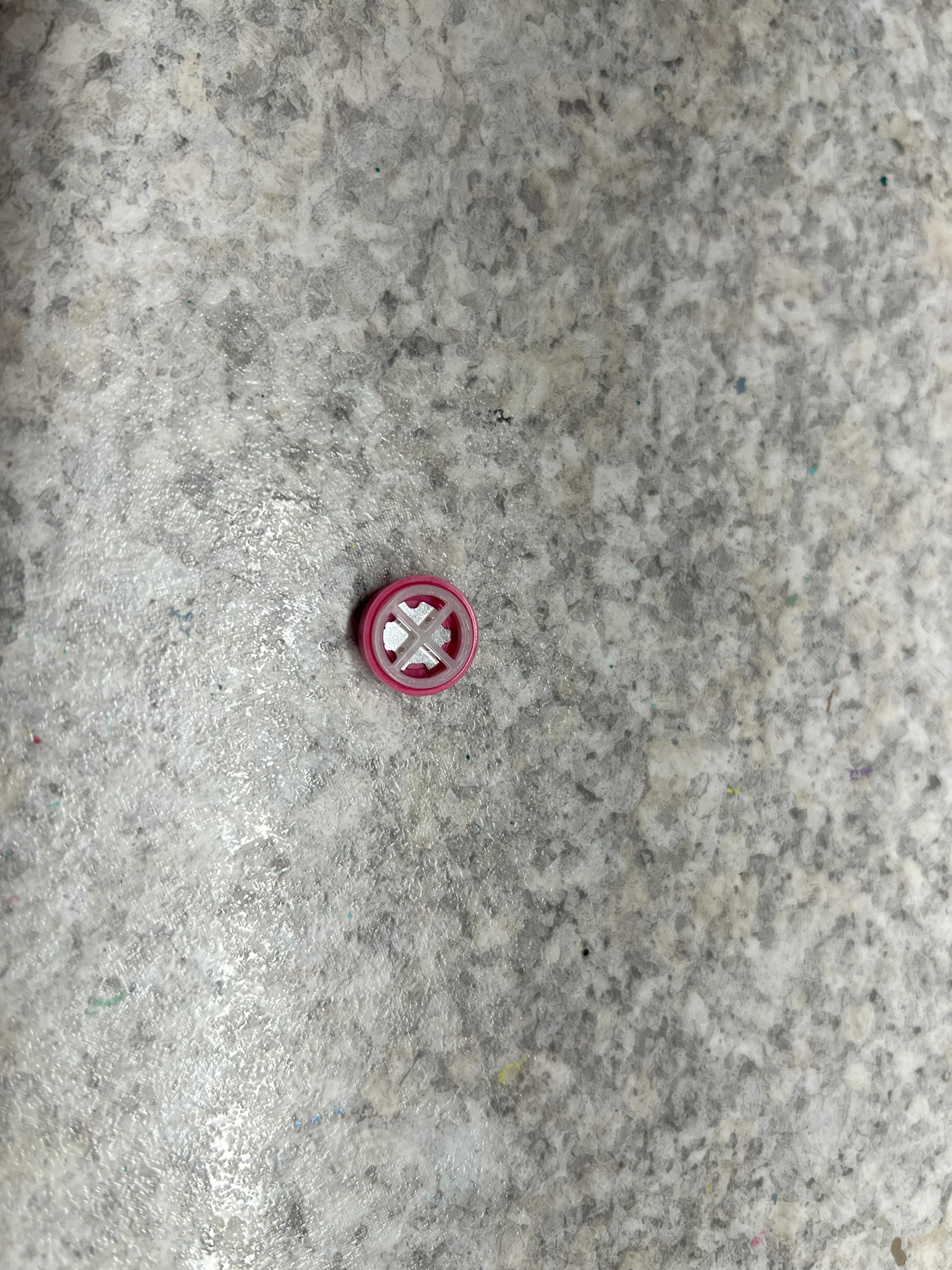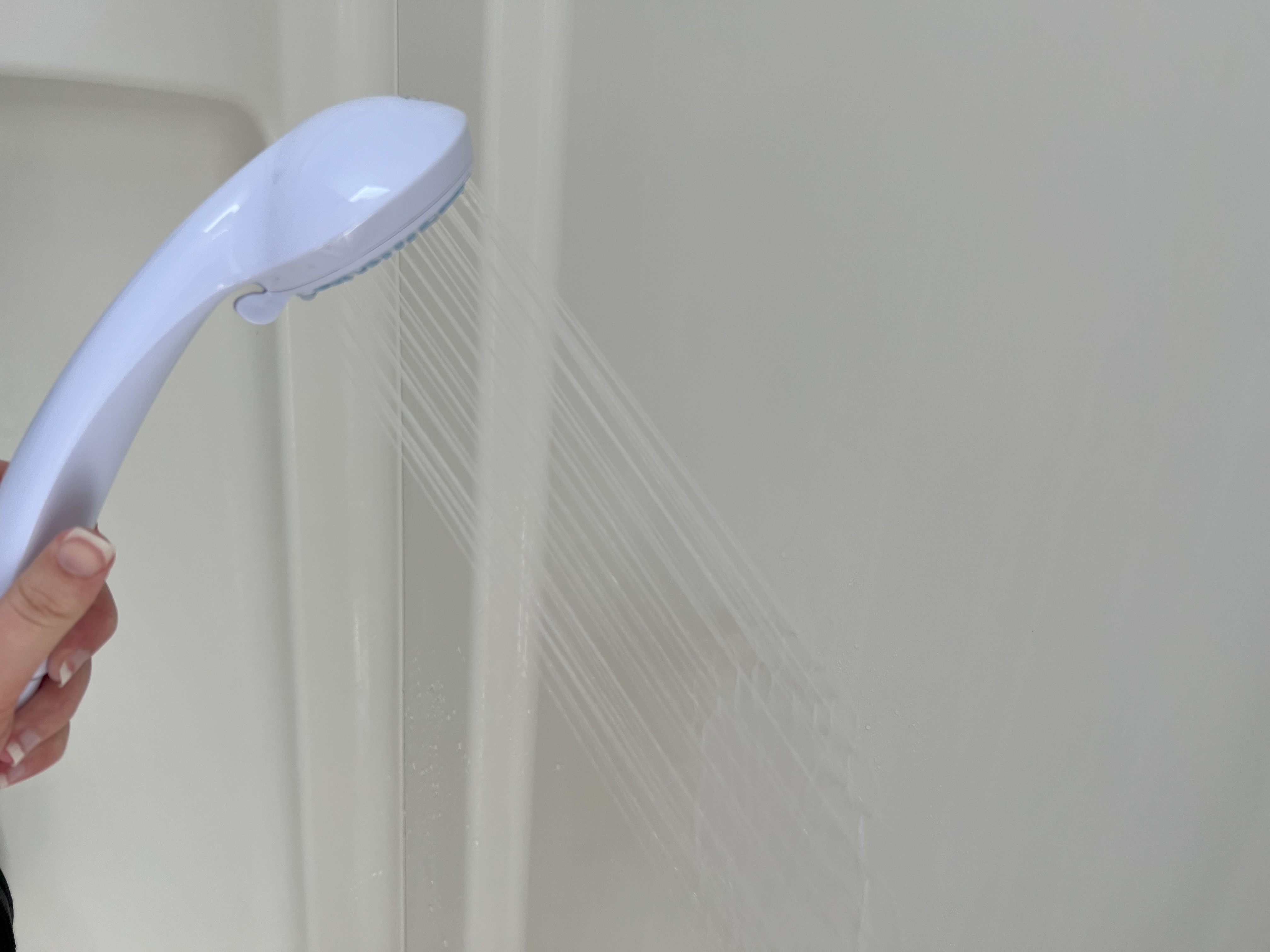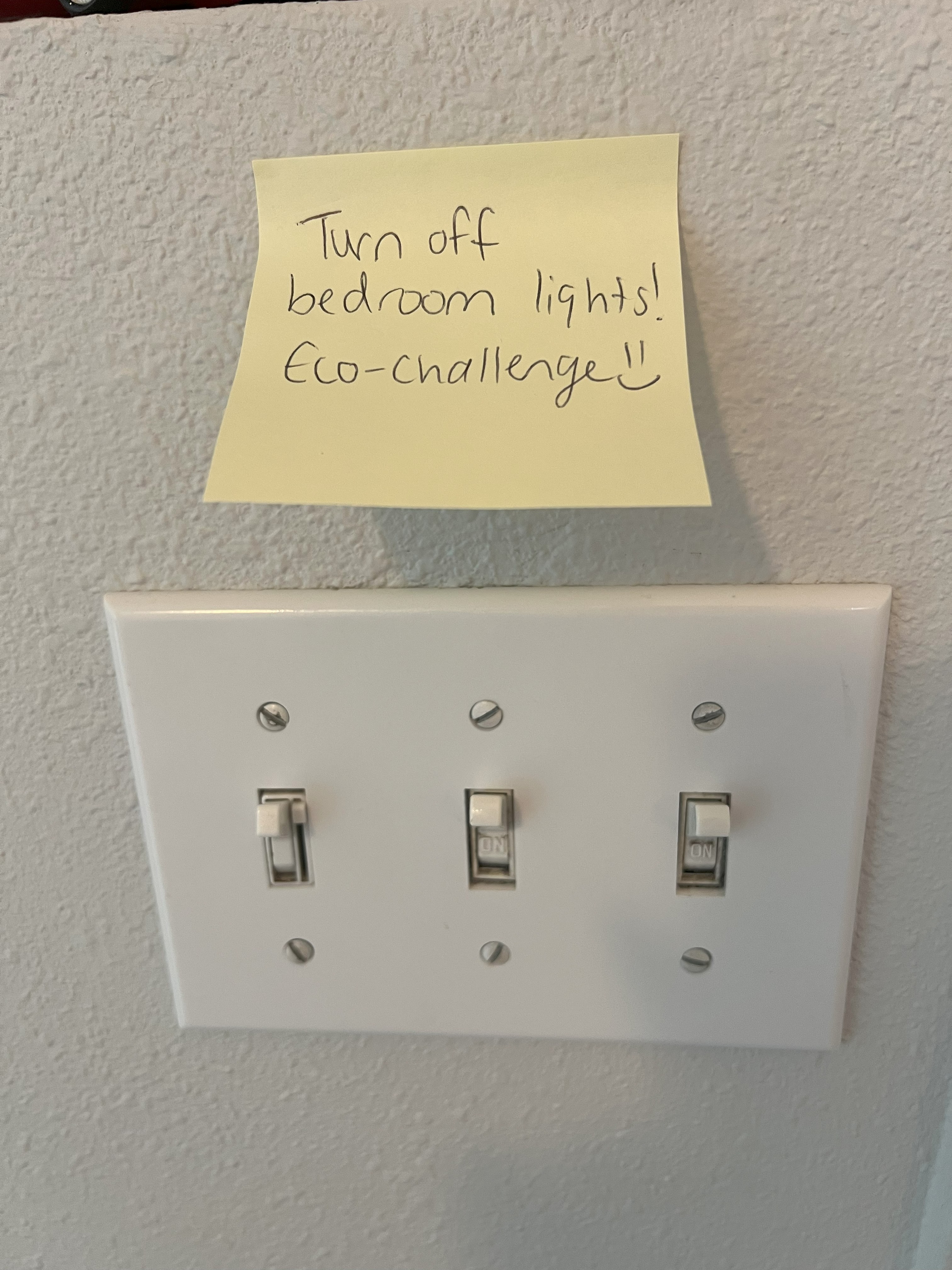Dianna Ferrell
"Geography and GIS Student"
POINTS TOTAL
- 0 TODAY
- 80 THIS WEEK
- 751 TOTAL
participant impact
-
UP TO8.0poundswaste composted
-
UP TO450gallons of waterhave been saved
-
UP TO1.0community eventhosted or attended
-
UP TO90minutesspent learning
Dianna's actions
Waste
Compost Food Waste
I will avoid sending up to .42 lbs (.19 kg) of food waste to the landfill each day by composting my food or learning how to.
Energy
Turn it off
I will keep lights, electronics, and appliances turned off when not using them.
Nature
Explore My Area
I will explore at least one new hiking trail or nature walk in my area.
Food
Try a New Way to Prep
I will try a new method of food preparation, such as canning, pickling, or baking bread.
Water
Install a Low-Flow Showerhead
I will save up to 15 gal (56 L) of water a day or 450 gal (1,680 L) a month by installing a low-flow showerhead.
Community
Host A Watch Party
I will host a watch party to screen a documentary about an issue that matters to me.
Simplicity
De-Clutter My Home or Dorm Room
I will de-clutter, clean, and donate or recycle unneeded items in my home or dorm room.
Participant Feed
-
 Dianna Ferrell 7/12/2025 4:43 PMFor my Session 5 Community Eco-Challenge I did a two part action! I first hosted a watch party and invited a friend and some family to watch a documentary with me and I also gave out some zucchini I grew in my garden throughout the week to a couple of individuals in my local community. This week's content focused on community and the importance of fostering relationships. Sharing and exchanging resources with other people locally is one action that was mentioned throughout this week's information on community, which is why I chose to share some of my homegrown produce with those around me. Sustainability requires people to come together while utilizing the resources each person has. When people share their food they have grown in their gardens, it reduces food waste along with showing kindness to those around them who may be struggling to buy healthy food options.
Dianna Ferrell 7/12/2025 4:43 PMFor my Session 5 Community Eco-Challenge I did a two part action! I first hosted a watch party and invited a friend and some family to watch a documentary with me and I also gave out some zucchini I grew in my garden throughout the week to a couple of individuals in my local community. This week's content focused on community and the importance of fostering relationships. Sharing and exchanging resources with other people locally is one action that was mentioned throughout this week's information on community, which is why I chose to share some of my homegrown produce with those around me. Sustainability requires people to come together while utilizing the resources each person has. When people share their food they have grown in their gardens, it reduces food waste along with showing kindness to those around them who may be struggling to buy healthy food options.
This week's Session 5 content in the textbook mentioned Eco-Villages. Eco-Villages are a rather new concept to me and I wanted to learn more which was why I chose to host a watch party. Watching a documentary with others can be challenging because in my case they were not as passionate about the topic I showed, but it benefited everyone who came in the end because they all learned about something new (Eco-Villages) and became more curious about the lifestyle and being sustainable! At my watch party I played the documentary called Season 1 Episode 2: Dancing Rabbit Ecovillage (https://www.youtube.com/watch?v=UFTmKfvbbes) which focused on explaining the life dynamics at this Eco-Village through multiple interviews with current residents. Throughout the film, there were some really neat sustainable practices people engaged in that kept the community close. One was a very large community garden that the residents tended to and ran a local grocery store in the village for people to obtain fresh affordable produce. The grocery store represented a place for people to gather and exchange goods with one another. Another really neat sustainable practice they shared was building homes from natural resources and recycled materials which can be old reclaimed wood, and windows from abandoned houses that were being torn down. Each house was built through a community effort which allowed people to connect better with one another while exchanging architecture tips. Lastly, all decisions at Dancing Rabbit incorporate the voices of everyone. Decisions are made together as a community, ensuring that everyone has a chance to voice any concerns or desires on how to improve the Eco-Village. I love the concept of living as a community that is connected with one another where people are able to make an impact in each other's lives. I do not live in an Eco-Village but I do think I could practice some of these morals in my own life, such as reusing items and listening to what people have to say to be mindful of the environment and those around me.
I have included two photos of batches I picked of green and yellow zucchini's! (Before anyone comments on the plastic bag... we reuse it for produce in our garden that we pick, it has lived on in our home for a while). My zucchini plants have been really successful with producing this year which provides excellent opportunities for me to share my produce with those around me. I wanted to give zucchini to a neighbor but it did not work out for me this week, but I hope to try again in the future. However, I ended up giving some to a few family members and friends that are local and they were thrilled to receive them. Zucchini's can be tricky to hand out because not everyone likes them and this was a challenge I faced. I had to search to find someone who was willing to take them which was a challenge in engaging in this Eco-Challenge of giving away produce. However it ended up being successful in the end by finding alternative people instead to give my zucchini's to for my Eco-Challenge this week who are still a part of my local community. It made me feel really good to be able to share my produce with other people as it benefitted me by connecting with others and reducing my food waste from over abundance in my garden :)!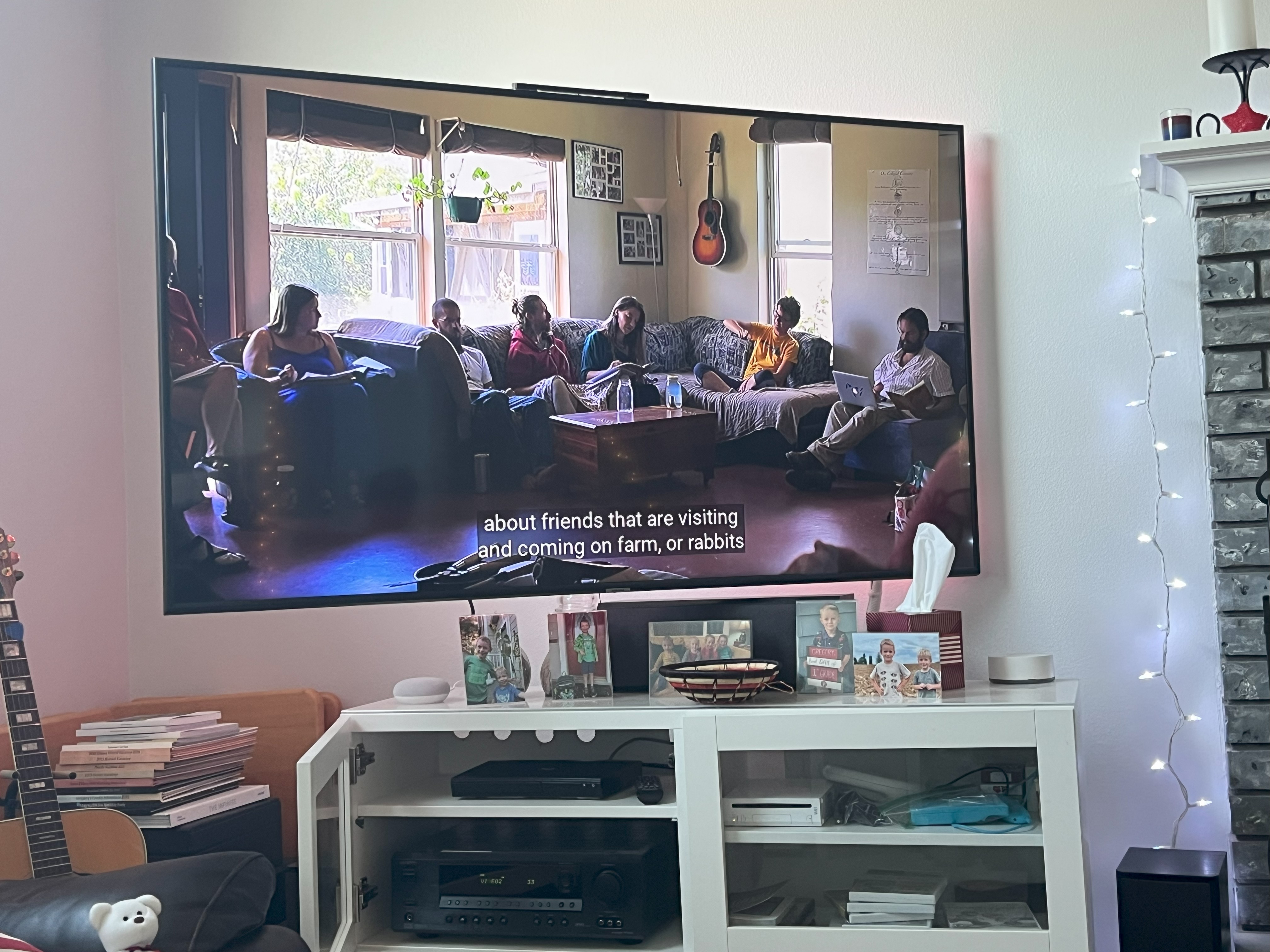
-
 Amy Minato 7/14/2025 7:53 PM
Amy Minato 7/14/2025 7:53 PM- TEAM CAPTAIN
thanks for the link to the eco village documentaries! it helps to see these ideas in action..
-
-
 Dianna Ferrell 7/12/2025 2:29 PMRead me if you want to see some maps! :) - GIS (Geographic Information Science) & Geography in action!
Dianna Ferrell 7/12/2025 2:29 PMRead me if you want to see some maps! :) - GIS (Geographic Information Science) & Geography in action!
Apologies in advance, this one is a bit long, but thank you to anyone who chose to read anyways! Hello all for my Eco-Challenge for Session 6 connecting to Transportation I have chosen to make my own Eco-Challenge, which is to map out a couple of my favorite places that I like to go in Hillsboro, my home city. This week's session focused on issues related to transportation. Transportation is important to sustainability because different modes of transportation differing levels of negative or positive impacts to the nature environment. Gas powered vehicles produce carbon dioxide and when we choose to bike or walk, we are not only being healthier for our bodies by practicing exercise but it also lessens the amount of pollutants that are released into the atmosphere. Sustainability focuses on looking for ways to create a healthier environment for humans, ecosystems and the environment, creating a co-existence of organisms. Traditionally biking, walking and public transit are some common ideas for reducing pollutants in sustainable practices for transportation. I am not in a personal place to switch to biking or using public transit but I do want to try walking more to places I frequently visit. In order to conduct an analysis of some examples that are realistic to walk, I have chosen to utilize my knowledge in using GIS!
To begin, Geography and the sub discipline of GIS are two academic focuses that can be very important to sustainability and environmental issues. Having a geographer that is also a GIS professional involved in environmental decision making brings in other useful skills that are compatible with the field of sustainability and issues related to environmental science. Story Maps, interactive & static maps, GIS dashboards, spatial statistics and GIS analyzes are GIS related techniques/skills/products that bring in some really neat visualizations that can help address and aid discussions on sustainability and environmental topics. How so? I will use my Eco-Challenge as an example. My goal in this GIS analysis is to examine areas in Hillsboro (where I live) that I frequently visit that would be realistic to walk to, while determining which are best to opt to drive.
The first map displays seven places I like to go in Hillsboro, each have their own symbol and label in the legend. There is also a boundary polygon displaying Hillsboro, along with a purple circle that has been placed around my neighborhood (for privacy, I have chosen to use my neighborhood as the center point). The purpose of the first map is to just show where everything is that I have selected. My second map is identical to the first with the exception of buffers. These circles which may look a little crazy, but don't worry I will explain. The buffer tool creates a circle that has a specified distance. I chose three different buffers, 1 mile, 3 miles an 5 miles. As a side note, the colors have no meaning to the buffers, they were chosen only to identify places easier. Now to break down the results! Costco Wholesale, New Seasons and Primary Care Providence are all 1 mile or less from my home, these are places I can most definitely choose to walk to instead of taking my car. The UPS Store and HUG Grill Buffet are 3 miles or less away from my home, in a pitch I could possibly walk to these, but the weather would have to be doable and I would need to plan strategically ahead to prepare for a longer walk. Lastly, the Goodwill Bins and Rood Bridge Park are 5 miles or less away from my home, these are too far to walk. I would have to opt to drive in order to visit these locations.
In conclusion, driving is more realistic for places that are further away, but I can say with confidence there are a handful of places I like to go in Hillsboro that I could walk to. By choosing to walk instead of taking my care I would be practicing sustainability by reducing the amount of greenhouse gases being released as pollution into the environment while also improving my physical health. This activity was a challenge because it made me more self-aware of my lack of logic on when choosing to walk or drive. I realized I drive way too often to places that are less than a mile away from my house. Yikes! However this Eco-Challenge benefitted me by using my skills in GIS to help me learn my transportation patterns while gaining an understanding on where I can make a difference at the individual level when it comes to transportation options and opting to walk instead of taking my car.
(Maps created using ArcGIS Pro Version 3.4)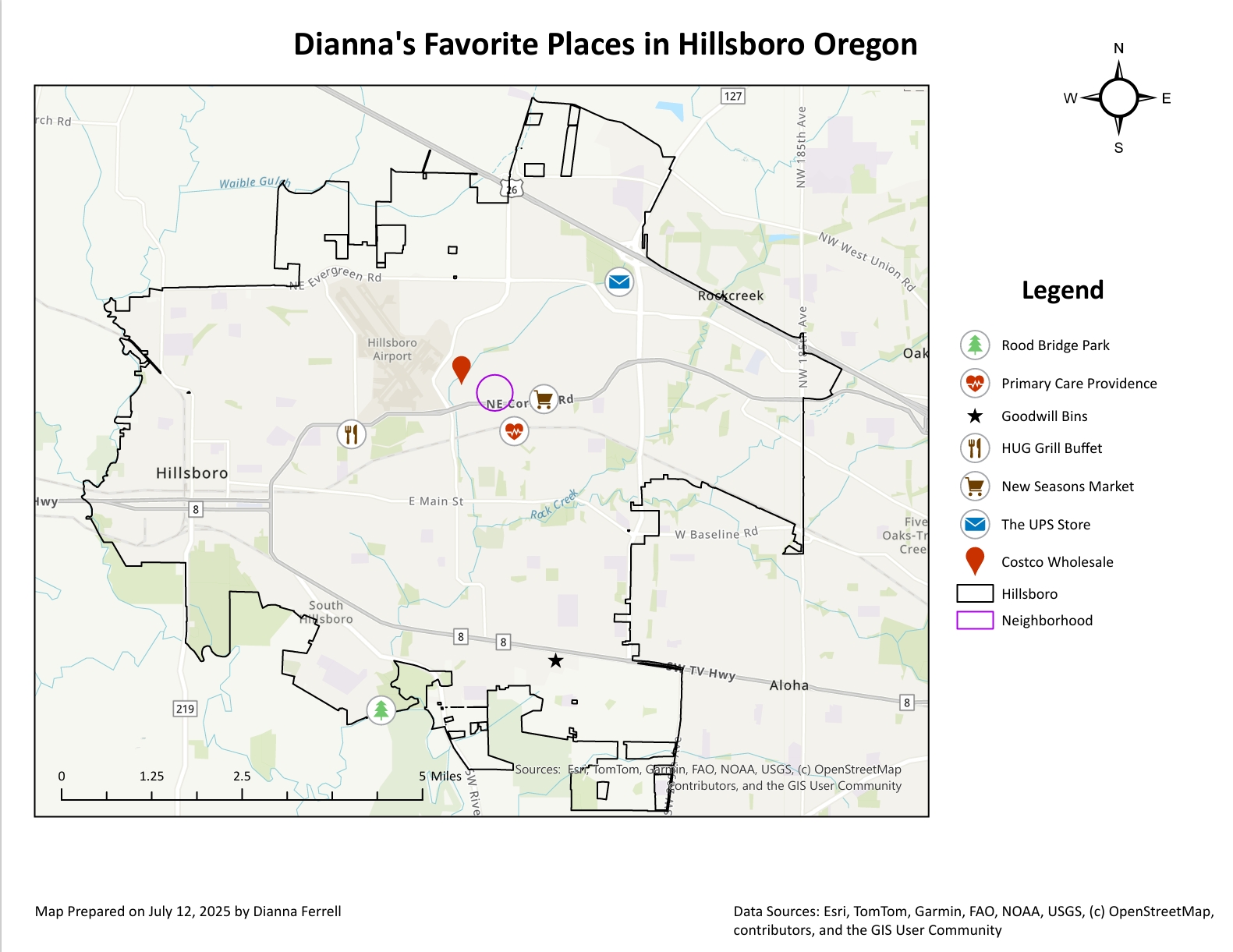
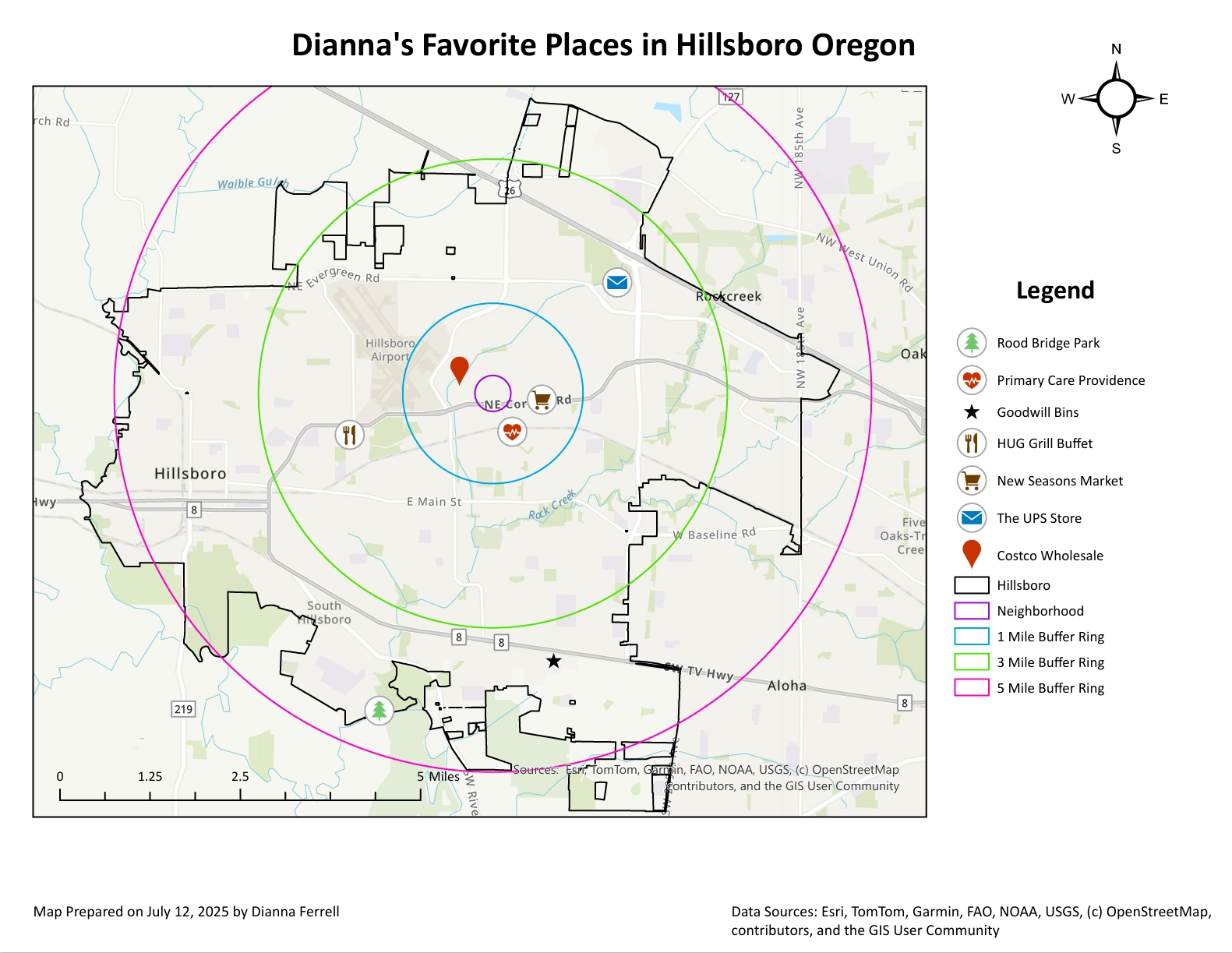
-
 Amy Minato 7/14/2025 7:55 PM
Amy Minato 7/14/2025 7:55 PM- TEAM CAPTAIN
i love the idea of mapping out with GPS places you go and matching them with transportation modes!
-
-
 Dianna Ferrell 7/05/2025 10:45 AMFor this week's Eco-Challenge connecting to Session 3: Food, I have chosen to participate in making my own bread (with a twist) and researching how to make my own pickles. Making your own bread and pickling connects to the content we have been learning in the book and in class because globally people waste a lot of food by bulk buying items at the grocery store. By preparing homemade meals the consumer can be more in control of the proportions they are making for consumption while also relying on fresher ingredients that require quicker eating. Another topic that has been discussed is chemicals in our food such as pesticides and preservatives play a role too. When making homemade foods there is less of a risk of chemicals being added into food sources. Consumers can also choose to be fully organic and buy ingredients from trustworthy and local sources for pickling and baking bread.
Dianna Ferrell 7/05/2025 10:45 AMFor this week's Eco-Challenge connecting to Session 3: Food, I have chosen to participate in making my own bread (with a twist) and researching how to make my own pickles. Making your own bread and pickling connects to the content we have been learning in the book and in class because globally people waste a lot of food by bulk buying items at the grocery store. By preparing homemade meals the consumer can be more in control of the proportions they are making for consumption while also relying on fresher ingredients that require quicker eating. Another topic that has been discussed is chemicals in our food such as pesticides and preservatives play a role too. When making homemade foods there is less of a risk of chemicals being added into food sources. Consumers can also choose to be fully organic and buy ingredients from trustworthy and local sources for pickling and baking bread.
I am not a not a regular bread eater in the context of sandwich bread or loaves, but I really like cinnamon rolls, which technically is a bread item… We regularly purchase Annie’s cinnamon rolls, which are prepackaged and ready to go for baking. Annie’s is a better product ingredient wise compared to other pre-made cinnamon rolls, but homemade usually does not contain as many preservatives and other unknown ingredients. Instead of relying on the internet for a cinnamon roll recipe I looked through the cookbooks and recipes we already had at home and successfully found a recipe for me to try! (See image below of the recipe).
A little fun fact for those that do not know me, I have a silent physical disability. I have a couple of fused bones in both of my wrists bilaterally that did not separate when I was in the womb which can make certain daily tasks really challenging. This is because my bone structure is a lot weaker, leading to uncomfortable pain. I face a lot of challenges when it comes to cooking by hand, the process of stirring for long periods of time and lifting heavy pots/pans can be trickier for me than the everyday person. It can be really defeating because I love to cook, but thanks to modern technology this challenge can be solved. To make this recipe successful without discomfort I used a bread machine. It mixed all the ingredients and then did the rest of the steps by hand. Bread machines are good for those who have a disability and great for those who just want to save time :). Photos below of some steps I took, the recipe turned out great, it was delicious, and I would make it again with the use of modern technology!
I have been interested in learning to make my own pickles for some time now because pickles are one of my favorite snacks and I eat them regularly. However, the issue is that I always buy them from the grocery store. This week’s Eco-Challenge gave me the opportunity to research more on pickle making. After looking over multiple recipes, I discovered a recipe called Easy Homemade Pickles (https://cookieandkate.com/best-pickles-recipe/). This recipe introduces something called refrigerator pickles which do not require the typical canning process and are ready in a couple of hours! Now this sounds like my type of recipe. A challenge I face with canning as it can be really time consuming and you must wait for the pickles to be ready. The problem with time has always deterred me from following through with trying canning recipes and by locating one that is simpler and fast I believe this could solve the contradiction I face with pickling. The recipe focuses on the typical dill pickle flavor and if I am wanting to try sweet pickles, I am sure an ingredient adjustment would work fine if the process itself is still followed. This year I am growing two types of cucumbers, garden cucumbers and lemon cucumbers. Given I am going to slice the cucumbers instead of doing a full cucumber in the jar, the type of cucumber will not really matter in this case. (I will not be using the lemon cucumbers because they have big sides and are round shaped). My cucumbers are not ready to be picked so this pickling cooking DIY will be an activity for the future!-
 Amy Minato 7/07/2025 7:31 PM
Amy Minato 7/07/2025 7:31 PM- TEAM CAPTAIN
-
-
 Dianna Ferrell 7/03/2025 4:00 PM(Repost- first attempt contained an error... I wish we could delete our posts or edit them..)
Dianna Ferrell 7/03/2025 4:00 PM(Repost- first attempt contained an error... I wish we could delete our posts or edit them..)
For this week’s water themed Eco-Challenge, I have chosen to make a two-part commitment to reducing my water usage! The two commitments are using a low-flow showerhead and conserving water in the shower. Ironically this week my showerhead broke and left me with having to purchase a new one. When looking over the water Eco-Challenges I saw one about installing a low-flow showerhead which led me into learning more about the benefits of having a low-flow showerhead and ultimately purchasing one for my replacement showerhead. Eco challenge provides a resource called Low-Flow Aerators / Showerheads (https://learn.eartheasy.com/guides/low-flow-aerators-showerheads/) which talks about a type of low-flow showerhead called Aerators. Aerator showerheads mix air into the stream creating a consistent flow of misty water. This conserves water because less water is produced through the air being pushed out into the stream. I chose an Aerator showerhead, below is a photo of the device inside the showerhead that makes the low-flow Aerator misty. The photo of the showerhead shows a steady stream of water that is still effective for showering. The low-flow showerhead went really well, the installation was smooth and I was able to take a shower like normal without noticing much of a difference in the quality of my shower.
Although low-flow showerheads do help conserve water, showering still uses quite a lot of water, especially when taking lengthy showers. The article Saving water during shower time (https://www.watercorporation.com.au/Help-and-advice/Waterwise/Bathroom/Saving-water-during-shower-time) provides some helpful ideas on how to reduce water usage when showering. One example that was talked about was taking quick showers and turning off the water when shampooing and shaving. For me, I have no problem with taking a quick 5-minute shower, but the instant I am needing to shave my legs the speed of my shower greatly increases- who wants to cut themselves in a hurry anyways? Shaving my legs is a big personal problem for me as I have never really thought about stopping the flow of the shower when lathering up and shaving. This week I have been practicing this commitment and turning off the water when I am putting on shampoo/conditioner along with when it is a shave-day and focusing on using the water only when it is time to rinse off! It took some time to get used to as the shower felt very different without the constant stream of water on me and I had to adjust my mindset to be thrilled about the change at first which was an obstacle. After practicing multiple times I adjusted and have managed to successfully handle this change :).
Both of my Eco-Challenges relate to this week's content for Session 4: Water because we are reaching a global crisis on over-using the water resources we have and being wasteful of this precious resource. Some areas are experiencing a lack of clean-water sources while other places like Hillsboro, Oregon where I live, there is a delusion of an abundance of water that is free-flowing. I admit I am actively adding to this problem and need to be more mindful of the amount of water I use in my individual activities such as showering! Over-using water costs more money and by practicing ways of conservation, I can help reduce the water bill while also being respectful and sustainable towards this natural resource that is essential to survival on our planet. This week's content has brought out the reality that clean water is not free, and by over-using water we are choosing to willingly participate in the wasteful culture that is being normalized in the United States. I hope to continue to improve in this area where I can and look for how I can make an impact on the individual level!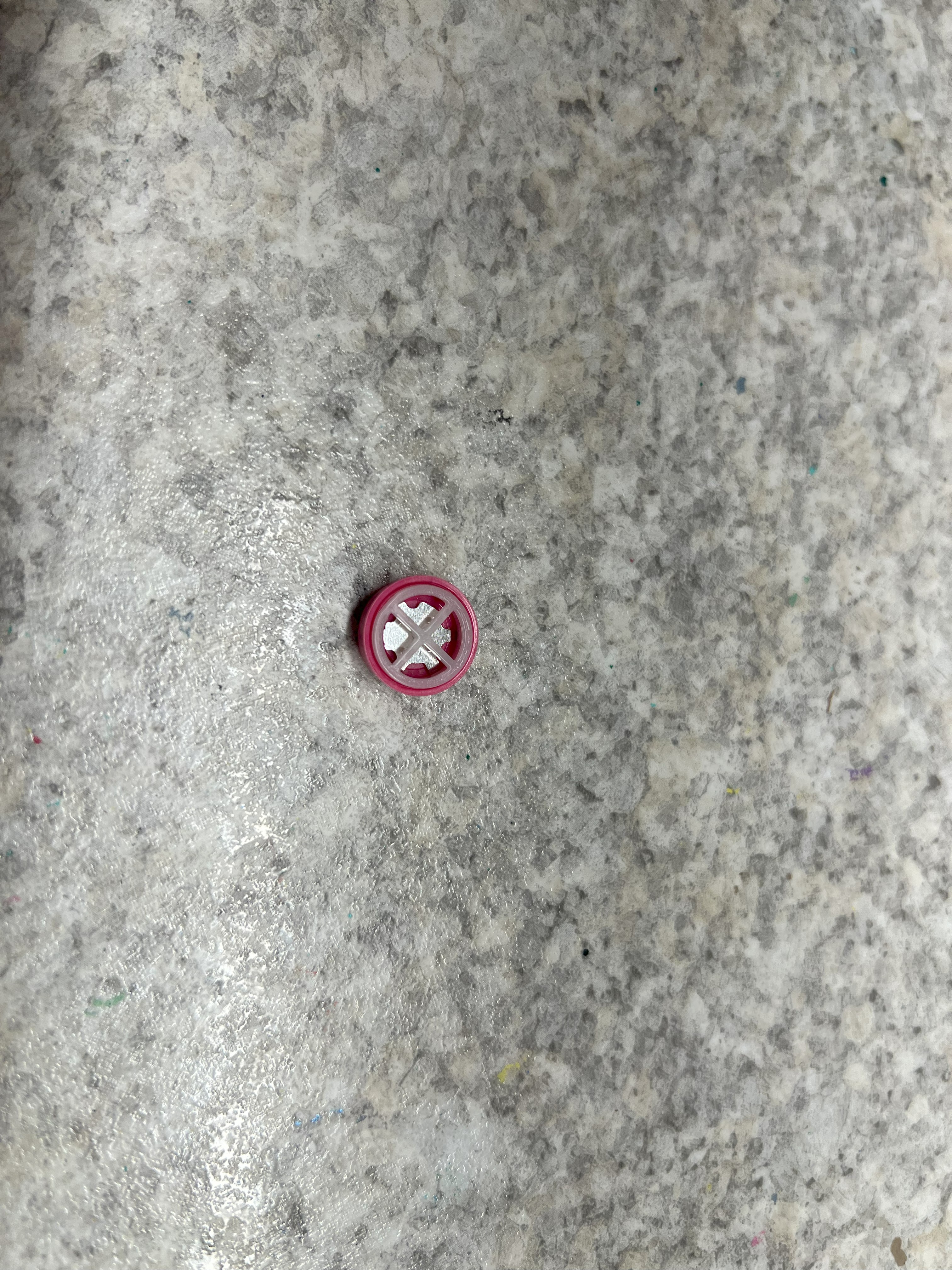
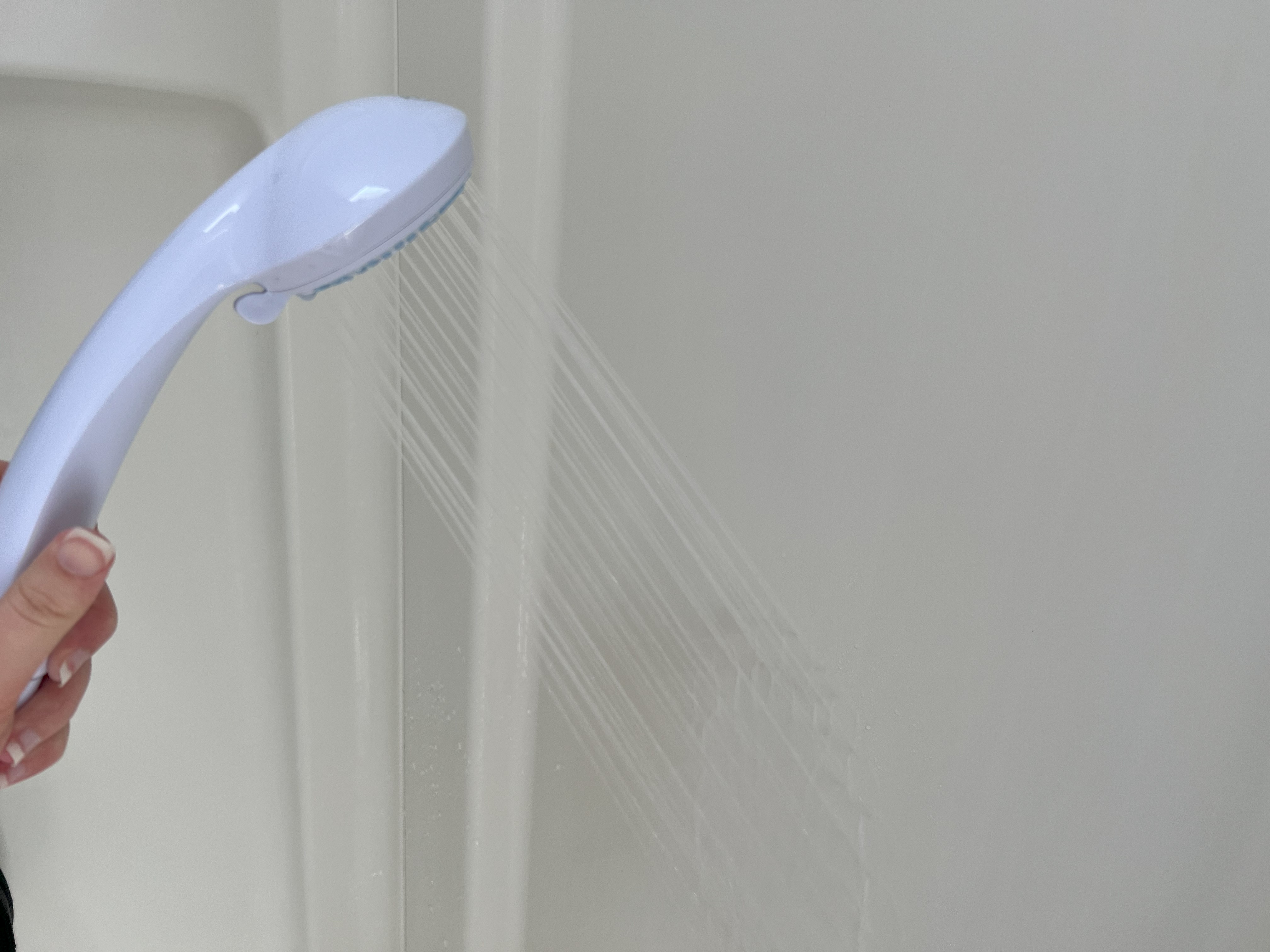
-
 Amy Minato 7/07/2025 7:30 PM
Amy Minato 7/07/2025 7:30 PM- TEAM CAPTAIN
-
 Kenya Quio 7/05/2025 12:46 PMThe comment you made about water not being free was very important to add. I think since we are able to access clean water but with a cost leads us to forget that others in this country and outside of the country, that same privilege for water is not the same. While we're able to use our water, others need to go out of their way to be able to access clean water. Thanks for your insightful post :)
Kenya Quio 7/05/2025 12:46 PMThe comment you made about water not being free was very important to add. I think since we are able to access clean water but with a cost leads us to forget that others in this country and outside of the country, that same privilege for water is not the same. While we're able to use our water, others need to go out of their way to be able to access clean water. Thanks for your insightful post :) -
 Rose Tucker 7/04/2025 7:28 AMCool. I'm glad it worked out that you could get a shower head that reduces waterflow.
Rose Tucker 7/04/2025 7:28 AMCool. I'm glad it worked out that you could get a shower head that reduces waterflow.
Turning water off while shaving is a good idea too. I shave about once a week, and It really does take a little time.
-
-
 Dianna Ferrell 7/03/2025 3:49 PMFor this week’s water themed Eco-Challenge, I have chosen to make a two-part commitment to reducing my water usage! The two commitments are using a low-flow showerhead and conserving water in the shower. Ironically this week my showerhead broke and left me with having to purchase a new one. When looking over the water Eco-Challenges I saw one about installing a low-flow showerhead which led me into learning more about the benefits of having a low-flow showerhead and ultimately purchasing one for my replacement showerhead. Eco-Challenge provides a resource called Low-Flow Aerators / Showerheads (https://learn.eartheasy.com/guides/low-flow-aerators-showerheads/)which talks about a type of low-flow showerhead called Aerators. Aerator showerheads mix air into the stream creating a consistent flow of misty water. This conserves water because less water is produced through the air being pushed out into the stream. I chose an Aerator showerhead, below is a photo of the device inside the showerhead that makes the low-flow Aerator misty. The photo of the showerhead shows a steady stream of water that is still effective for showering.
Dianna Ferrell 7/03/2025 3:49 PMFor this week’s water themed Eco-Challenge, I have chosen to make a two-part commitment to reducing my water usage! The two commitments are using a low-flow showerhead and conserving water in the shower. Ironically this week my showerhead broke and left me with having to purchase a new one. When looking over the water Eco-Challenges I saw one about installing a low-flow showerhead which led me into learning more about the benefits of having a low-flow showerhead and ultimately purchasing one for my replacement showerhead. Eco-Challenge provides a resource called Low-Flow Aerators / Showerheads (https://learn.eartheasy.com/guides/low-flow-aerators-showerheads/)which talks about a type of low-flow showerhead called Aerators. Aerator showerheads mix air into the stream creating a consistent flow of misty water. This conserves water because less water is produced through the air being pushed out into the stream. I chose an Aerator showerhead, below is a photo of the device inside the showerhead that makes the low-flow Aerator misty. The photo of the showerhead shows a steady stream of water that is still effective for showering.
Although low-flow showerheads do help conserve water, showering still uses quite a lot of water, especially when taking lengthy showers. The article Saving water during shower time (https://www.watercorporation.com.au/Help-and-advice/Waterwise/Bathroom/Saving-water-during-shower-time) provides some helpful ideas on how to reduce water usage when showering. One example that was talked about was taking quick showers and turning off the water when shampooing and shaving. For me, I have no problem with taking a quick 5-minute shower, but the instant I am needing to shave my legs the speed of my shower greatly increasing- who wants to cut themselves in a hurry anyways? Shaving my legs is a big personal problem for me as I have never really thought about stopping the flow of the shower when lathering up and shaving. This week I have been practicing this commitment and turning off the water when I am putting shampoo/conditioner along with when it is a shave-day and focusing on using the water only when it is time to rinse off! It took some time to get used to as the shower felt very different without the constant stream of water on me but I have managed to successfully handle this change :).
Both of my Eco-Challenges relate to this week's content for Session 4: Water because we are reaching a global crisis on over-using the water resources we have and being wasteful of this precious resource. Some areas are experiencing a lack of clean-water sources while other places like Hillsboro, Oregon where I live, there is a delusion of an abundance of water that is free-flowing. I admit I am actively adding to this problem and need to be more mindful of the amount of water I use in my individual activities such as showering! Over-using water costs more money and by practicing ways of conservation, I can help reduce the water bill while also being respectful and sustainable towards this natural resource that is essential to survival on our planet. This week's content has brought out the reality that clean water is not free, and by over-using water we are choosing to willingly participate in the wasteful culture that is being normalized in the United States. I hope to continue to improve in this area where I can and look for how I can make an impact on the individual level! -
 Dianna Ferrell 6/29/2025 2:15 PMHey all! Here's my very trashy check-in that is getting a little stinky (ha... get it?). Anyways... thank you all for the wonderful comments and advice about composting! I greatly appreciate all of it. I wanted to check-in and show my starting to get halfway full cooler of food scraps. For now I have not invested in anything different or found a contained for the kitchen, since the weather is so nice I have the cooler by the back door to our patio which is working out fine for now, once the weather is icky I will probably have to rethink my set up. Soon I will need to begin thinking about the long-term and what steps I need to engage in to continue this composting adventure, but I figured it was worth showing my progress since I actually want to keep this up long-term :). Apologies about my shadow it was so sunny today and getting a photo was tricky! Lots of tangerine and lemon peels made it into the bin today, I made some freshly squeezed lemon and tangerine juice into a pitcher of ice water- so refreshing!
Dianna Ferrell 6/29/2025 2:15 PMHey all! Here's my very trashy check-in that is getting a little stinky (ha... get it?). Anyways... thank you all for the wonderful comments and advice about composting! I greatly appreciate all of it. I wanted to check-in and show my starting to get halfway full cooler of food scraps. For now I have not invested in anything different or found a contained for the kitchen, since the weather is so nice I have the cooler by the back door to our patio which is working out fine for now, once the weather is icky I will probably have to rethink my set up. Soon I will need to begin thinking about the long-term and what steps I need to engage in to continue this composting adventure, but I figured it was worth showing my progress since I actually want to keep this up long-term :). Apologies about my shadow it was so sunny today and getting a photo was tricky! Lots of tangerine and lemon peels made it into the bin today, I made some freshly squeezed lemon and tangerine juice into a pitcher of ice water- so refreshing!
-Dianna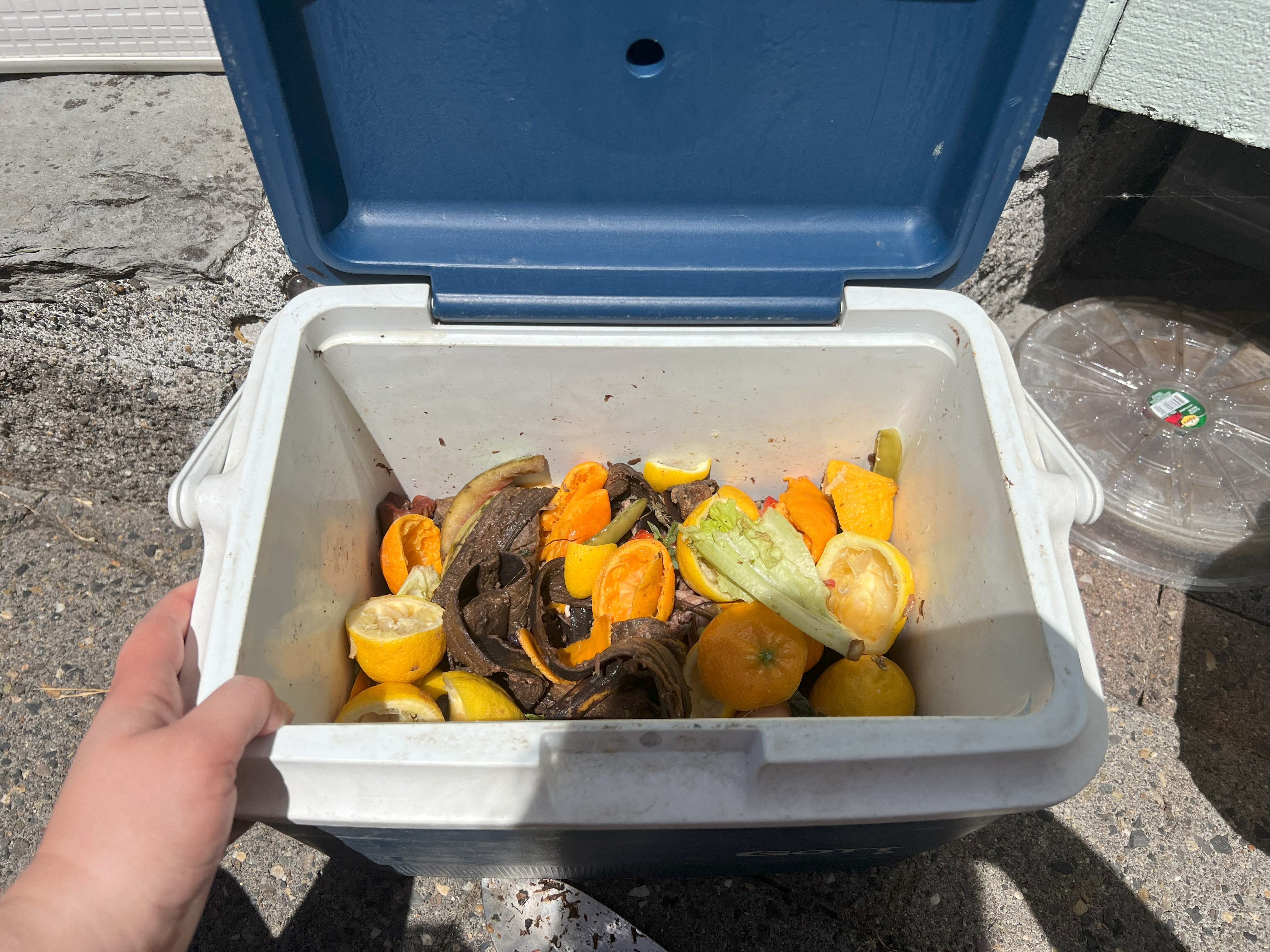
-
 Veronica Mullins 7/05/2025 12:50 PMHi Dianna,
Veronica Mullins 7/05/2025 12:50 PMHi Dianna,
I love the idea of re-using an old cooler for this purpose. I went digging around my garage and found something similar so that I may replicate your idea. Thank you so much for sharing!
I can't figure out how to get the picture to upload. ): But my compost cooler contains some left over pasta and avocado skins. I currently have it inside a "compostable bag" inside the cooler, however I may decide against this in the future if it seems pointless. I hope to acquire a large compost bin in the future so I may make my own soil, but for now I will dispose of it in my city compost bin once a week.
-Veronica
-
-
 Dianna Ferrell 6/27/2025 3:27 PMFor my energy Eco-Challenge I have chosen to work on improving my laptop's energy usage and remembering to turn off light-switches. Through this challenge I changed a couple of settings my pc actually had available that are supposed to lower my carbon-footprint! (See screenshot below). Eco-Challenge provided a resource called Shrink Your Dorm Print (https://smarterhouse.org/resources/shrink-your-dorm-print) which focuses on ways students can make their dorms more sustainable for the environment. In the article it discusses that students often use the most energy powering their computers- which is understandable given how many assignments are all online now. However, often people have a bad habit of leaving their computers on even when not in use. Oops I am guilty of this myself! Finding these helpful settings in my Lenovo was a great change for me to make as it forces my laptop to be more efficient and less energy wasting on a daily basis. I especially like the two features that put the laptop to sleep or close the screen, although sleep mode is not the same as completely shut off, it is still better than having the laptop fully on and using energy without a user present.
Dianna Ferrell 6/27/2025 3:27 PMFor my energy Eco-Challenge I have chosen to work on improving my laptop's energy usage and remembering to turn off light-switches. Through this challenge I changed a couple of settings my pc actually had available that are supposed to lower my carbon-footprint! (See screenshot below). Eco-Challenge provided a resource called Shrink Your Dorm Print (https://smarterhouse.org/resources/shrink-your-dorm-print) which focuses on ways students can make their dorms more sustainable for the environment. In the article it discusses that students often use the most energy powering their computers- which is understandable given how many assignments are all online now. However, often people have a bad habit of leaving their computers on even when not in use. Oops I am guilty of this myself! Finding these helpful settings in my Lenovo was a great change for me to make as it forces my laptop to be more efficient and less energy wasting on a daily basis. I especially like the two features that put the laptop to sleep or close the screen, although sleep mode is not the same as completely shut off, it is still better than having the laptop fully on and using energy without a user present.
My other focus this week was being more mindful about turning off light switches. Ironically this has been an issue my family has complained about me for years... which makes this really relevant for me to take on for an Eco-Challenge. I acknowledge my weakness in this area. I am a tad absentminded and tend to leave the room completely forgetting to turn off the lights. This week in class we learned about two different issues, one about communities that have a lack of energy to produce basic needs as simple as having light and other examples where light pollution from access energy usage has taken over a city. Energy is important to sustainability but it is a double edged sword. Energy gives us light to see and power to use technology aiding everyday needs, but energy is not free, and we should conserve energy as much as we can while finding better alternatives for sustainability. My life is falling into the light-pollution problem with energy, I have more lights turned on than I should/need! I located the article How many watts does a light bulb use? (https://www.energysage.com/electricity/house-watts/how-many-watts-does-a-light-bulb-use/) because I wanted to learn more about the cost of keeping lights on (United States only) and the differences between LED and incandescent light bulbs. LED's are substantially more affordable in the long-run, they use less kilowatts per year and are a cheaper cost for energy bills. LED's also do not produce heat like incandescent light bulbs do which is another positive alternative to going LED as it helps with rising temperatures for climate change.
Luckily I can say with confidence my family ditched the incandescent light bulbs years ago. However, LED's do still use energy and I need to work on remembering to turn off the lights. However I was facing the challenge I have always faced, I am absentminded and forgetful. I needed to think of something else as head-knowledge about the Eco-Challenge wasn't enough as my rate of turning off the lights was a 50% chance. In order to do this Eco-Challenge I placed sticky notes on the most used light switches in my living space. I am happy to report the sticky notes massively helped as my brain saw a visual reminder every time I went to leave the room to turn off the lights. My hope is maybe if I keep this pattern up, I can eventually remove the sticky-notes. If I can do this successfully I will have adapted a new sustainable practice that will not only help the environment, save money and save energy usage but also please my family! :)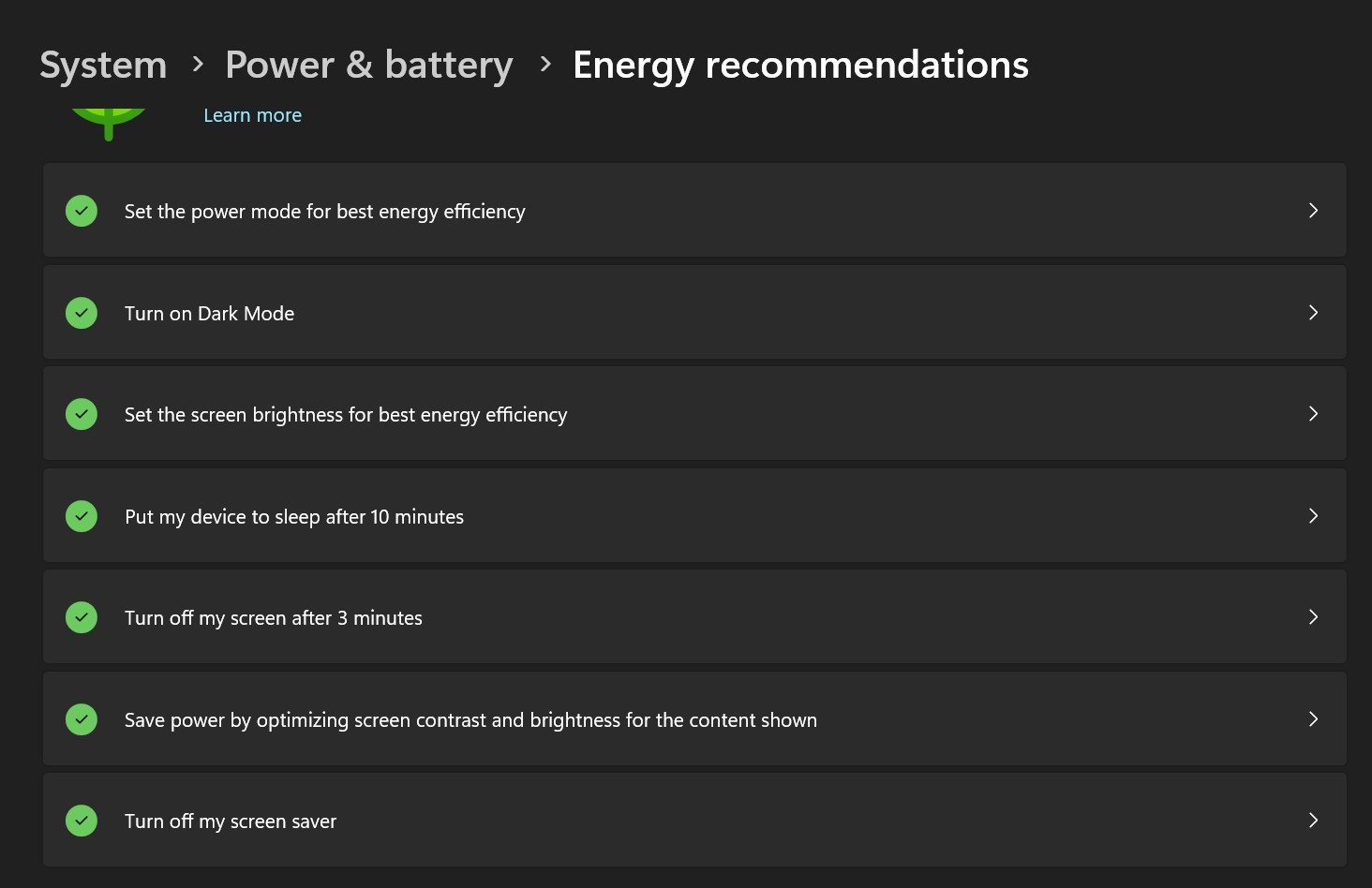
-
 Amy Minato 7/07/2025 7:32 PM
Amy Minato 7/07/2025 7:32 PM- TEAM CAPTAIN
-
 Kenya Quio 6/27/2025 6:04 PMI liked the idea of posting notes on the light switches to remind not just yourself but your family as well. I as well got my family involved in the eco-challenge as we also have the problem of leaving one or multiple lights on. LED lights are a great switch from regular light bulbs, and we definitely still need to make the switch to only using LED lights. Thanks for sharing the positive experience you and your family had with this challenge.
Kenya Quio 6/27/2025 6:04 PMI liked the idea of posting notes on the light switches to remind not just yourself but your family as well. I as well got my family involved in the eco-challenge as we also have the problem of leaving one or multiple lights on. LED lights are a great switch from regular light bulbs, and we definitely still need to make the switch to only using LED lights. Thanks for sharing the positive experience you and your family had with this challenge.
-
-
 Dianna Ferrell 6/24/2025 9:45 PM(Repost-)
Dianna Ferrell 6/24/2025 9:45 PM(Repost-)
I have never tried composting before, and I am a gardener, therefore I feel this is the perfect Eco-Challenge for me to start with this week's topic of waste! Composting connects to our class content for this week because we watched videos on how to be resourceful and reduce waste. Being resourceful means using what we already own to create something sustainable and useful for both our health and the environment. Reducing waste refers to limiting the number of items that make it to the landfill. By practicing composting I am reducing my food waste, reducing the number of scraps that go to the landfill, and being resourceful by turning my food waste into a soil-mixture that will benefit my already established garden beds in the backyard by providing an eco-friendly fertilizer.
The two challenges I faced with this Eco-Challenge were that I did not own a compost bin and I was unaware of what items can be composted. The first resource I looked over was How to Compost (https://www.wikihow.com/Compost) which talks about having a bin under the kitchen sink. Our sink cabinet is currently full and being used for storage, but I plan on investigating where I can put a bin near the kitchen (I will check-in later for an update on this!). Since the goal is to be sustainable and I do not currently own a compost bin I felt the best way to overcome the challenge of not having a compost bin is to make do with a make-shift bin. Eco-Challenge provided this helpful resource called Composting Is Way Easier Than You Think (https://www.nrdc.org/stories/composting-way-easier-you-think). In this article it is talked about how a compost bin does not have to be perfect and we can use anything that has a lid and is accessible for when I move the compost around with a shovel. My Dad located an old cooler in the shed that we do not use anymore that happens to have a handle and a lid- perfect!
To solve the lack of understanding what can be compostable I found Composting is Way Easier Than You Think resources from Eco-Challenge to be the most useful. This link contains a diagram of compostable items and scraps that are not. Some of the items listed in the diagram that I added into my compost bin are fruit scraps (apple core, banana peels and grape stems) and loose tea bags. The article also mentioned napkins could be compostable which I added into the bin, however the usage of napkins was not included in the diagram and only written out in the article. I briefly cleaned up the cooler and carefully picked out all the compostable items from our kitchen garbage can to begin the compost process. I feel satisfied with my simple set up as I used an item for a bin that I already owned, I rescued food scraps from the garbage can and I have set a realistic goal for myself to continue composting even bast this Eco-Challenge post. Composting will also greatly benefit my love of gardening by providing healthy sustainable soil like mixture to incorporate into my soil. How to Compost mentioned a helpful tip I learned which is to spray compost to help keep it moist throughout the process. Eventually I will invest in something better to put the compost in, but for now I am working with what we to begin this Eco-Challenge.-
 Kenya Quio 6/25/2025 10:56 PMThat’s a great start! You used a resource you already had and put it to good use and I enjoyed reading all the research you have done to learn more about composting. I’ve seen a lot of other videos having a smaller container on their countertops but they add dirt and coffee grinds to help with the smell as other bigger containers get worms added to it to eat the food that gets added.
Kenya Quio 6/25/2025 10:56 PMThat’s a great start! You used a resource you already had and put it to good use and I enjoyed reading all the research you have done to learn more about composting. I’ve seen a lot of other videos having a smaller container on their countertops but they add dirt and coffee grinds to help with the smell as other bigger containers get worms added to it to eat the food that gets added. -
 Rose Tucker 6/25/2025 2:57 PMIf you are putting the compost directly in the garden, I recommend digging a hole and burying it. that will reduce the amount of rats that come into the yard looking for the goods. there are other methods of garden composting, eg getting a big bucket, putting compost layered with earth and turning it.) and it is a process like anything else. i have things i prefer to compost out back (coffee grinds, egg shells) and things i prefer to put into the city compost (moldy sandwich, processed food sources). like everything the journey will be unique to your preferences.
Rose Tucker 6/25/2025 2:57 PMIf you are putting the compost directly in the garden, I recommend digging a hole and burying it. that will reduce the amount of rats that come into the yard looking for the goods. there are other methods of garden composting, eg getting a big bucket, putting compost layered with earth and turning it.) and it is a process like anything else. i have things i prefer to compost out back (coffee grinds, egg shells) and things i prefer to put into the city compost (moldy sandwich, processed food sources). like everything the journey will be unique to your preferences.
-
-
 Dianna Ferrell 6/24/2025 5:11 PMI have never tried composting before, and I am a gardener, therefore I feel this is the perfect Eco-Challenge for me to start with this week's topic of waste! Composting connects to our class content for this week because we watched videos on how to be resourceful and reduce waste. Being resourceful means using what we already own to create something sustainable and useful for both our health and the environment. Reducing waste refers to limiting the number of items that make it to the landfill. By practicing composting I am reducing my food waste, reducing the number of scraps that go to the landfill, and being resourceful by turning my food waste into a soil-mixture that will benefit my already established garden beds in the backyard by providing an eco-friendly fertilizer.
Dianna Ferrell 6/24/2025 5:11 PMI have never tried composting before, and I am a gardener, therefore I feel this is the perfect Eco-Challenge for me to start with this week's topic of waste! Composting connects to our class content for this week because we watched videos on how to be resourceful and reduce waste. Being resourceful means using what we already own to create something sustainable and useful for both our health and the environment. Reducing waste refers to limiting the number of items that make it to the landfill. By practicing composting I am reducing my food waste, reducing the number of scraps that go to the landfill, and being resourceful by turning my food waste into a soil-mixture that will benefit my already established garden beds in the backyard by providing an eco-friendly fertilizer.
The two challenges I faced with this Eco-Challenge were that I did not own a compost bin and I was unaware of what items can be composted. The first resource I looked over was How to Compost (https://www.wikihow.com/Compost) which talks about having a bin under the kitchen sink. Our sink cabinet is currently full and being used for storage, but I plan on investigating where I can put a bin near the kitchen (I will check-in later for an update on this!). Since the goal is to be sustainable and I do not currently own a compost bin I felt the best way to overcome the challenge of not having a compost bin is to make do with a make-shift bin. Eco-Challenge provided this helpful resource called Composting Is Way Easier Than You Think (https://www.nrdc.org/stories/composting-way-easier-you-think). In this article it is talked about how a compost bin does not have to be perfect and we can use anything that has a lid and is accessible for when I move the compost around with a shovel. My Dad located an old cooler in the shed that we do not use anymore that happens to have a handle and a lid- perfect!
To solve the lack of understanding what can be compostable I found Composting is Way Easier Than You Think resources from Eco-Challenge to be the most useful. This link contains a diagram of compostable items and scraps that are not. Some of the items listed in the diagram that I added into my compost bin are fruit scraps (apple core, banana peels and grape stems) and loose tea bags. The article also mentioned napkins could be compostable which I added into the bin, however the usage of napkins was not included in the diagram and only written out in the article. I briefly cleaned up the cooler and carefully picked out all the compostable items from our kitchen garbage can to begin the compost process. I feel satisfied with my simple set up as I used an item for a bin that I already owned, I rescued food scraps from the garbage can and I have set a realistic goal for myself to continue composting even bast this Eco-Challenge post. Composting will also greatly benefit my love of gardening by providing healthy sustainable soil like mixture to incorporate into my soil. How to Compost mentioned a helpful tip I learned which is to spray the compost to help keep it moist throughout the process. Eventually I will invest in something better to put the compost in, but for now I am working with what we have to begin this Eco-Challenge.
-
 Amy Minato 6/30/2025 3:27 PM
Amy Minato 6/30/2025 3:27 PM- TEAM CAPTAIN
cool idea! I knew someone once who just tilled food scraps directly into his garden! Tanaya make sure the coffee filters are not bleached... -
 Tanaya Hulsey 6/29/2025 1:44 PMI think is amazing. I did not realize that napkins were compostable. (If that is a word). I will definitely take that into consideration myself. I know sometimes that we save old coffee filters that have been used in a coffee can with a lid or egg shells. My partner then disperses it around the fruit trees in the yard to fertilize.
Tanaya Hulsey 6/29/2025 1:44 PMI think is amazing. I did not realize that napkins were compostable. (If that is a word). I will definitely take that into consideration myself. I know sometimes that we save old coffee filters that have been used in a coffee can with a lid or egg shells. My partner then disperses it around the fruit trees in the yard to fertilize.
-

